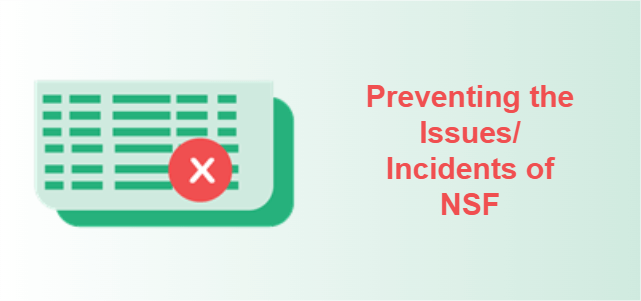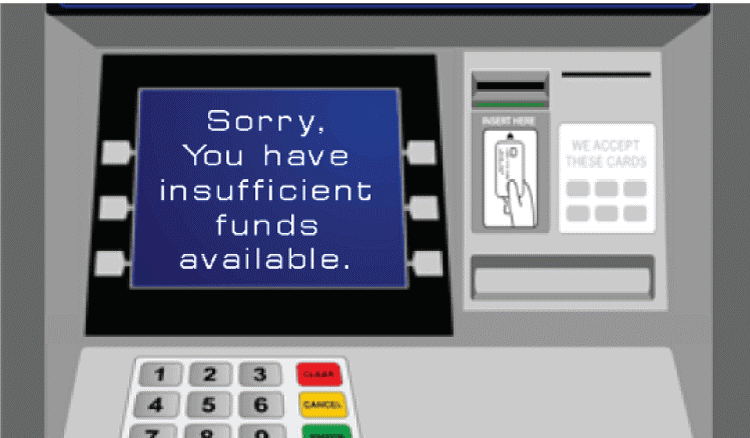Non-Sufficient Funds (NSF): What It Means & How to Avoid FeesWhen someone tries to make a payment or transaction but does not have enough money in his/ her bank account to cover the amount, it is known as having insufficient funds, or NSF (non-sufficient funds). When someone writes a cheque or starts an electronic payment without having enough money, this issue often arises. In such circumstances, the payment is frequently rejected or returned, which has several negative effects on the account holder. 
NSF occurrences can have a wide range of causes. An inadequate account balance, which may be the result of bad money management, excessive spending, or unforeseen expenses, is one of the main causes. Furthermore, late deposits may also result in NSF if the money is used up before it becomes available. A hold may be placed on deposited funds by some financial institutions, which may cause an NSF if a payment is made before the hold is released. Last but not least, inaccurate record-keeping of account balances and ongoing transactions might result in inaccurate estimations of the amount of funds available and, as a result, NSF events. NSF can have serious repercussions on both the account holder and the recipient of the payment. When a transaction is attempted with insufficient cash, banks and other financial institutions frequently incur overdraft fees. These costs might be inexpensive or quite expensive, which puts a further burden on the person's finances. Additionally, the recipient of the payment does not get the money, which can ruin relationships and lead to further fines, late fees, or even service suspension. The Process of NSFThe NSF process typically includes the following steps:
Preventing NSF Incidents
Budgeting and expense monitoring are important steps in reducing NSF situations. Make sure your budget is reasonable and keep meticulous records of your spending. Start by determining your sources of income and allocating money for necessities like housing, utilities, and groceries. Include any recurring payments, such as subscriptions and loan instalments. You may lower the chance of NSF events by making sure you have enough money to cover your debts by having a clear understanding of your financial commitments. Apart from these, the following things should also be tried: Keeping a Buffer in Your Checking AccountKeeping a buffer in your checking account is essential for preventing NSF issues. This safety net ensures that you always have enough money to meet any unforeseen costs or brief cash flow hiccups. Keep your account balance above any minimum balance thresholds you may decide to set. Keep an eye on your account balance regularly and top it off if it starts to become low. This routine will provide you comfort and aid in preventing NSF situations. Using Account Alerts and NotificationsThe majority of banks and financial institutions offer account alert services that let you know when significant things happen, including when your balance is getting low or when a bill is due. Take advantage of these alerts and customize them to suit your needs. Alerts are available via email, text messages, and banking apps. You will be able to take quick action and avoid NSF problems by staying updated about your account activity thanks to these notifications. Examining Overdraft Protection OptionsAn effective strategy for preventing NSF situations is overdraft protection. It enables you to connect a different account to your checking account, like a line of credit or a savings account. If there aren't enough funds, the bank will immediately withdraw money from the associated account to make up the difference. Be aware, though, that there could be fees or interest associated with overdraft protection. Examine the requirements of your overdraft protection option carefully to determine if it is the best option for your financial position. Automating Payments and Corresponding with CreditorsIt's essential to keep lines of communication open with your creditors if you want to avoid NSF occurrences. Contact your creditors in advance to seek alternate arrangements or payment plans if you foresee having trouble making a payment. Additionally, think about setting automatic transfers or automating bill payments through online banking. This removes the possibility of forgetting or mismanaging your payments and guarantees that your invoices are paid on time. Resolving NSF Incidents
Causes of Non-Sufficient FundsNon-Sufficient Funds (NSF) can occur due to various factors, leading to financial challenges for individuals and businesses. Understanding the causes of NSF incidents is crucial for maintaining healthy financial management and preventing the negative consequences associated with insufficient funds in accounts. One of the primary causes of Non-Sufficient Funds is an inadequate account balance. Many individuals struggle with excessive spending or poor budgeting practices, resulting in depleted account balances. When expenses exceed available cash, there is a heightened risk of encountering NSF issues. Impulsive spending, a lack of financial discipline, or inaccurate tracking of expenses can all contribute to this situation. It is important to adopt responsible financial habits and exercise better control over spending to maintain sufficient funds in accounts. Delayed deposits or non-cleared checks are another common cause of Non-Sufficient Funds. Some people rely on pending deposits or checks that have not yet cleared to cover their expenses. However, if these transactions do not materialize as expected, it can lead to an unexpected NSF situation. For instance, a delayed paycheck or a check that takes longer to clear can leave the account with insufficient funds, resulting in bounced payments. It is advisable to have a clear understanding of the timing of deposits and check clearances to avoid NSF incidents. Automatic payments and recurring charges can also contribute to Non-Sufficient Fund's occurrences. Many individuals set up automatic bill payments or subscribe to services with recurring fees. While this can be convenient, it can also lead to NSF problems if there are not enough funds in the account to cover these recurring expenses. People often overlook these automatic payments when managing their budgets, leading to NSF incidents and potential penalties. It is important to include automatic payments in budgeting and ensure sufficient funds are available to cover them. Insufficient funds in accounts can have various underlying causes. Poor financial management, a lack of awareness of available funds, or unforeseen financial emergencies can all contribute to an inadequate account balance. Additionally, unexpected expenses or financial hardships, such as medical bills, car repairs, or job loss, can further exacerbate the issue and result in insufficient funds. Developing effective financial planning strategies and building emergency funds can help mitigate these causes of NSF incidents. The consequences of Non-Sufficient Funds can be significant and wide-ranging. When a transaction is declined due to insufficient funds, financial institutions may impose overdraft fees. These fees can accumulate quickly, especially if multiple transactions are declined, creating a considerable financial burden for the account holder. These fees can deplete the account balance further, exacerbating the NSF problem. It is crucial to understand the terms and conditions of the account and the associated fees to minimize the impact of NSF incidents. Moreover, NSF incidents can have a negative impact on an individual's credit score and financial reputation. Bounced checks and failed payments due to insufficient funds can result in a negative record in credit reports. This can make it challenging to secure credit, loans, or even certain employment opportunities in the future. Maintaining a good financial track record by avoiding NSF incidents and promptly resolving any that occur is essential for preserving a positive credit history. Non-Sufficient Funds can also have legal and contractual consequences. Bounced checks are considered a breach of contract and may lead to legal action. In some jurisdictions, writing a check without sufficient funds is a criminal offence, potentially resulting in fines, penalties, or even imprisonment. Failed payments can also strain relationships with creditors or service providers, leading to service disruptions or legal consequences. It is important to prioritize open communication with relevant parties to resolve NSF issues and prevent further legal complications. NSF Fees vs. Overdraft FeesIn the realm of banking, there are two important terms to understand: non-sufficient funds (NSF) and overdrafts. Although they both relate to insufficient funds, they represent distinct transactions that can result in fees imposed by banks. Let's delve into the specifics to gain a clearer understanding. When a bank returns a payment, such as a check, due to insufficient funds, it triggers what is known as an NSF fee. To illustrate this, consider a scenario where a customer with $100 in their checking account initiates a payment for a purchase amounting to $120. Due to insufficient funds, the bank declines the payment, and an NSF fee is imposed, indicating that the presented payment could not be fulfilled. On the other hand, if the bank accepts the payment and covers the amount, but in doing so, the customer's checking account balance falls into negative territory, an overdraft (OD) fee is incurred. For instance, if the customer's account balance reaches -$20 after paying the seller, the bank imposes an overdraft fee. To mitigate the risk of overdrawing their accounts, customers often have the option of opting for overdraft protection. This allows the bank to approve transactions that exceed the available balance in the account. For instance, if a customer with $20 in their checking account attempts a $40 purchase using a debit or check card and has enrolled in the bank's overdraft program, the transaction may be accepted. However, if the customer has not opted-in to the overdraft plan, the retailer will decline the transaction. It's important to note that overdraft protection does not guarantee a fee-free experience. If the transaction is approved by the bank, they may assess an overdraft fee. Conversely, if the customer writes a check for the $40 transaction, the bank may choose to honor it and charge an overdraft fee, or reject it and impose an NSF fee. This occurs regardless of whether the customer has chosen to join the overdraft program. Understanding the distinction between NSF fees and overdrafts is essential when managing your banking transactions. By familiarizing yourself with these concepts, you can make informed decisions and avoid unnecessary fees, ultimately ensuring a smoother financial experience. The Bottom LineNon-Sufficient Funds (NSF) can be a significant financial challenge for individuals and businesses. Understanding the causes of NSF incidents is essential for maintaining healthy financial management and avoiding the negative consequences associated with insufficient funds in accounts. One of the primary causes of NSF is an insufficient account balance, often resulting from overspending or poor budgeting. Delayed deposits, cleared checks, and automatic payments can also contribute to NSF situations. It is crucial to be mindful of these factors and take proactive measures to prevent NSF incidents. The consequences of Non-Sufficient Funds can be severe. Overdraft fees imposed by financial institutions can accumulate quickly, creating a financial burden. Additionally, NSF incidents can have a negative impact on credit scores and financial reputations, making it challenging to secure credit or employment opportunities. Legal and contractual consequences, such as bounced checks leading to legal action, further emphasize the importance of avoiding NSF incidents. |
 For Videos Join Our Youtube Channel: Join Now
For Videos Join Our Youtube Channel: Join Now
Feedback
- Send your Feedback to [email protected]
Help Others, Please Share










